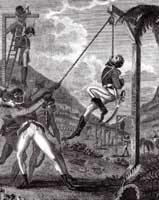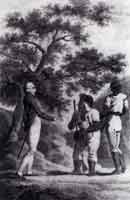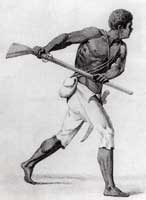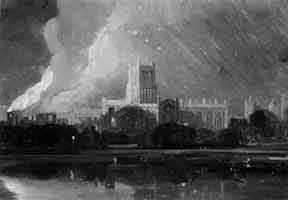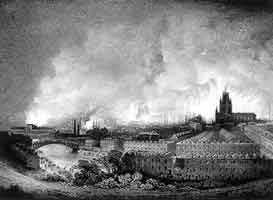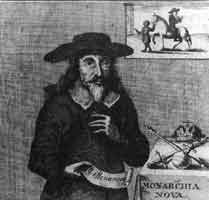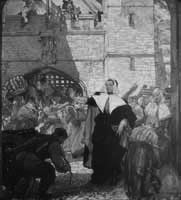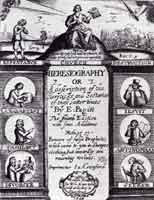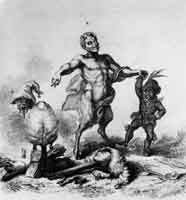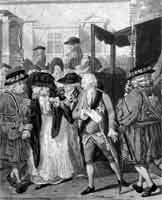Bristol Radical History Week 2006
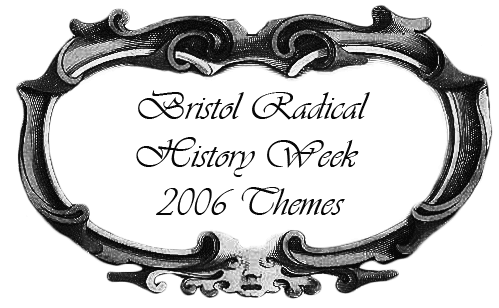
The Atlantic Slave Trade : Resistance and Rebellion
There were two evenings of lectures covering this theme (click the links for full details):
- Slavery: Resistance and Rebellion 1, Tuesday 31st October
- Slavery: Resistance and Rebellion 2, Wednesday 1st November
With the end of the British Empire and post-colonial studies there has been a significant need to assess the legacy of slavery. Much of the consequent history has been 'victim' orientated as a response to official histories. 2007 is the 200th anniversary of the 'so-called' end of slave trade. The British government has already stated that this 'celebration' will be centred around the legal reformers who 'abolished' the slave trade. Finally the context of slavery has been tightly defined by race.
None of these approaches are satisfactory as far as we are concerned. We are instead interested in the class nature of slavery, the activity of the slaves themselves and those exploited by the trade. These lectures will consider the long history of slavery in Bristol (both black and white), the numerous slave revolts that occurred in the Atlantic and the anti-slavery movement in Bristol. In addition speakers will provide their own critique of the 200th anniversary 'celebration' of the end of the slave trade.
Speakers: Madge Dresser, Richard Hart, Chris Brian, Dave Cullum, Edson Burton, Mark Steeds
Bristol's Insurrectionary History
There were two lectures and one panel discussion covering this theme (click the links for full details):
- Insurrectionary Bristol: 1831, Sunday 29th October
- Insurrectionary Bristol: 1980, Friday 3rd November
- Insurrectionary Bristol: Revolt of the Unemployed, Saturday 4th November
Bristol 1831, St. Pauls & Southmead 1980….were these events anarchy, crime, riot, insurrection or uprising? Much of the insurrectionary history of Bristol is misrepresented by those who do not believe 'common' people can have any thought or organized practice. Why are the French uprisings of 1789-1793 understood to be a revolution and 1831 in Bristol a drunken criminal mob? Why is it that the St. Pauls riot of 1980 exists in the memory but the Southmead events of the same weekend are forgotten? These talks will give an insight into the real nature of these and other events by both historians and eye-witnesses. We will try to uncover how and why they have been misrepresented or obscured and what influence they really had on the politics of the time.
Background Reading: Southmead Riots - by John Serpico
Speakers: Ian Bone, Ann Warden, Johnny Evans, Dave Backwith
Religious Radicals
There are two panel discussions covering this theme (click the links for full details):
- Religious Radicals 1: James Nayler , Saturday 28th October
- Religious Radicals 2: Dorothy Hazzard, Thursday 2nd November
Religious Radicals 1: James Nayler will be proceeded by the Launch Event.
Dorothy Hazard and James Nayler represented controversial radical religious currents in the 17th Century. Both of these preachers were products of an extraordinary time where the nature of religious belief, class, gender and sexuality were being challenged by non-conformist religious currents. Both were intentionally written out of history or forgotten until their recent rehabilitation. So was James Nayler a raving madman, the George Galloway of his time (as has been suggested by some) or an extraordinarily insightful activist for social change? Why were the actions of Dorothy Hazzard so important? These seminars will try to answer these questions.
Speakers: Brian Perry, Jonathan Barry, Phil Dickinson, Jonathan Harlow, Peter Linebaugh
Bristol and the Revolutionary Atlantic
There was a whole day of lectures and debates covering this theme (click the link for full details):
Did you know that in 1780 7% of the population of London was black? Did you know that at the same time 25% of the British Navy was black? Recent work on the theme of the 'Atlantic proletariat' in works such as the The Many Headed Hydra: Sailors, Slaves, Commoners and the Hidden History of the Revolutionary Atlantic has called into question the accepted history of the division of labourers, sailors and other workers by race and nation in the 17th and 18th centuries, especially in Atlantic ports such as Bristol. Instead it suggests that before measures for these divisions were put into place by the various ruling Empires, impressed sailors, indentured labourers, the transported and slaves fraternized together and fermented rebellions against their conditions. They often mutinied, became pirates, plotted insurrections or deserted to maroon colonies. These lectures will try to highlight the processes that led to revolts by these 'motley crews', to gauge how successful they were in escaping from their exploited existence and to see how the British rulers tried to deal with the 'Hydra' of revolt it had created.
Speakers: Peter Linebaugh, Ruth Symister, Niklas Frykman, Mark Steeds
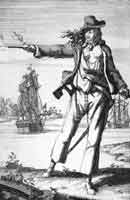
Anne Bonny, pirate.
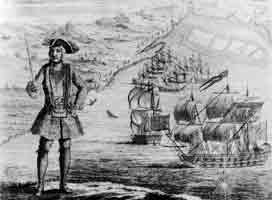
Pirate Bartholomew Roberts
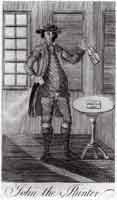
John the Painter, 1777.
Radical Bristol: the 1790's
There is an evening of lectures and debates covering this theme (click the link for full details):
The American and French revolutions marked the rise of an overt politics that both challenged the monarchies of Europe and proposed an alternative form of government in the form of the fledgling Republics. The new political ideas energized both intellectuals and artists in the middle classes and more dangerously began to diffuse into the emerging political movements of the working class in Britain. In the 1790s Britain was rife with rumours of 'Jacobin insurrectionary plots', show trials, Romantic revolutionaries and politicised mobs who might just push things a little too far….
Bristol had its share of pamphleteers and activists and high profile figures such as Coleridge, Beddoes and Southey. We will be looking at both this subversive milieu and the increasingly polarised popular politics, the 1792 strike wave and the rise of the radical mob.
Speakers: Mike Jay, Steve Poole, Steve Mills

